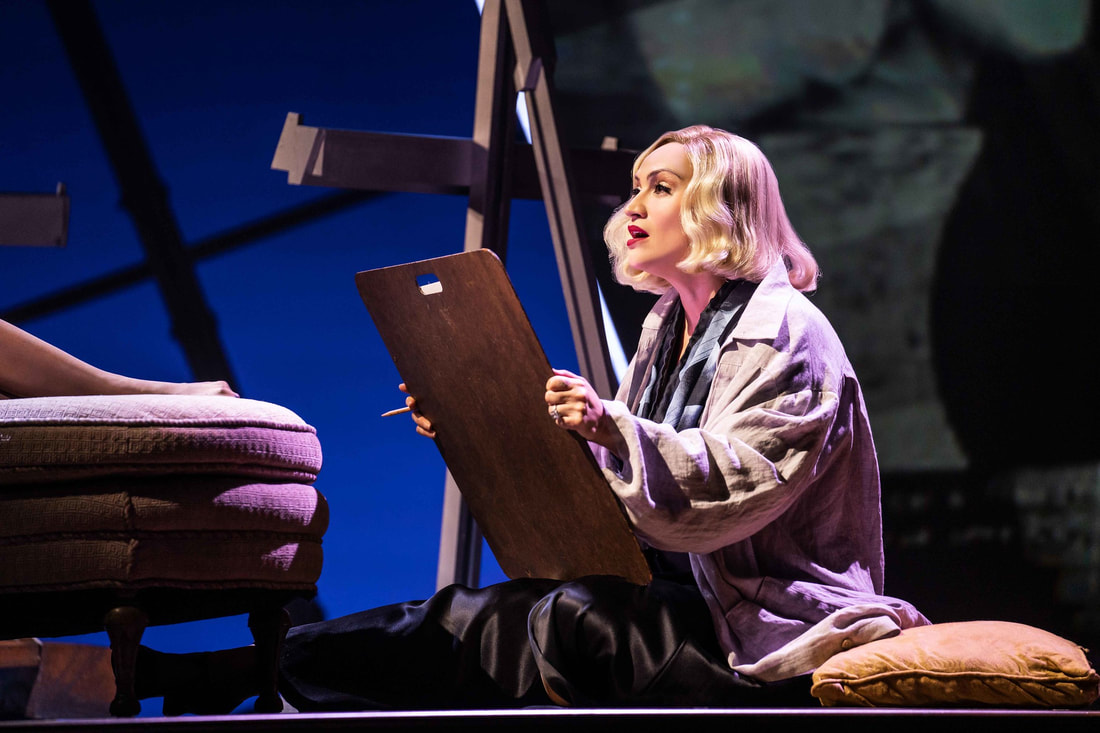|
Eden Espinosa in "Lempicka." Photo courtesy of La Jolla Playhouse More than once in the musical “Lempicka,” art student Tamara de Lempicka is decried by her teacher, the despotic Filippo Marinetti, as being a “difficult woman.” Women who are dauntless, ambitious and uncompromising, whether in the arts or not, are still being decried by threatened men as difficult, part of which makes Lempicka’s story as told in this dynamic new show at La Jolla Playhouse so contemporary and magnetic.
All the ingredients are here for “Lempicka,” which was originally planned to open in La Jolla in spring 2020, to be a Broadway-bound hit. Its director is Rachel Chavkin, who was at the helm of the hit “Hadestown” in New York. Its star is Eden Espinosa (“Wicked,” “Falsettos,” “Brooklyn the Musical”). Its cast includes Amber Iman, who portrayed Nina Simone on Broadway in “Soul Doctor.” Its staging in La Jolla is electric, with exciting choreography by Raja Feather Kelly, and stunning lighting (Bradley King) and projection (Peter Nigrini) design. It’s a production that’s as bold onstage as Tamara de Lempicka was in her turbulent life. With a book and lyrics by Carson Kreitzer and book and music by Matt Gould, “Lempicka” made its world premiere at the Williamstown Theatre Festival in 2018 in Massachusetts. Its subject: a Polish-born artist working prolifically in the Art Deco motif whose synthetic cubist portraits and nudes made her a darling of aristocrats, proto-feminists, and lesbians and bisexuals during the bohemian postwar ‘20s in Paris. Wow. That’s a foundation for a tale that begs telling. It’s told in “Lempicka” with a few liberties from historical fact, but very much in the spirit of this woman’s career ascendance and personal-life complications. After the introduction of a weary and cynical Lempicka (Espinosa) in L.A., land of “avocados and oranges” and plastic dreams in the early ‘70s, the narrative shifts back in time to the first of her many life-altering events. As a young woman, she is forced to flee her St. Petersburg, Russia, home with her husband, Tadeusz Lempicki (Andrew Samonsky) and their young daughter, upon the Bolshevik Revolution of 1917. Lempicki is arrested and is freed from prison only after an excruciating sacrifice by his wife, one he won’t learn about for years. Settling ultimately in Paris as refugees, Lempicka goes to work scrubbing floors while Tadeusz finds employment in a bank. Turning to a passion from childhood, she begins painting. When a wealthy baron (Victor E. Chan) takes notice of Lempicka and her work, she wins a booster and enrolls in art school at the Academie de la Grande Chaumiere. There, she becomes that student of Marinetti’s (George Abud). The “difficult woman” in due course defies him, revolts and overshadows him in his own milieu. Lempicka’s burgeoning career as an artist is only half the story. The other half is her infatuation with the prostitute Rafaela (Amber Iman) who becomes her lover, her model and her muse. All this during a time of incredible creative energy in Paris and, as the years pass, the threat of another world war and a more deadly and treacherous enemy than before. Spectacular projections and versatile set pieces (the art school, the “Dead Rat” and “Monocle” bars, Lempicka’s studio, et al) propel forward the storytelling and convey the passage of time and significance of events. Throughout, however, it’s Espinosa’s fierce portrayal of Lempicka that anchors this lengthy musical. This ferocity is no better expressed than in the Act One-closing “Woman Is,” in which she’s able to sing over the cascading orchestration conducted by Lorin Getline. The performance of Iman, who’s playing the part of Rafaela through July 10, after which Ximone Rose assumes the role, is just as integral to the emotional potency of “Lempicka.” Her nightclub knockoff song about the foolishness of love and a jazzy solo later in Act One are highlights of the evening, the latter on opening night winning extended applause from the audience. There’s also the simple connection between artist and muse vocalized in the tender “Stillness” number. That all four of the above songs are heard in the first act suggests that the second act of “Lempicka,” focused as much on the love triangle (Lempicka, her husband and Rafaela) as on creeping Naziism, is the weaker of the two. It’s not that what happens in Act Two is necessarily inevitable, but the score lacks some of the punch delivered before intermission. There’s also the issue of the Tadeusz Lempicki character, who aside from his good looks seems to me without the depth or fiber to make his wife’s choice between him and her lover so arduous. Two other characters are broadly drawn, though much fun to watch: Marinetti, who comes to bond with fascism in the cause of cementing futurism, and Suzy Solidor (Natalie Joy Johnson), the provocative lesbian singer, also one of Lempicka's models, who gets to open her own nightclub. Even with its imperfections, “Lempicka” is a fascinating and immersive musical that illuminates a flawed but compelling woman making art and making love during an unprecedented time in history. "Lempicka" runs through July 24 at La Jolla Playhouse's Mandell Weiss Theatre.
0 Comments
Leave a Reply. |
AuthorDavid L. Coddon is a Southern California theater critic. Archives
July 2024
Categories |
David Coddon |
|
